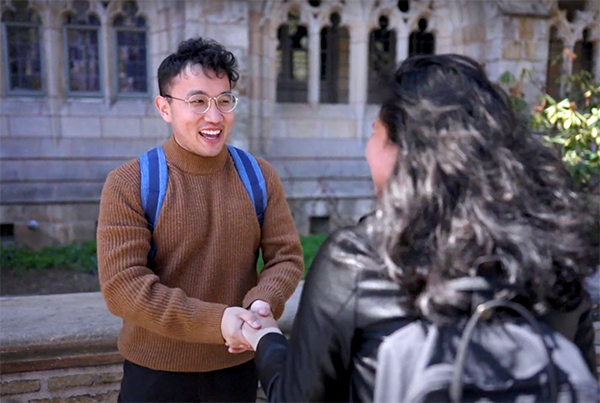Data Service: A Former ISPS Scholar Applies Science for the Public Good

As a Dahl research scholar with the Institution for Social and Policy Studies during the 2019-20 school year, Baji Tumendemberel helped organize a conference about the future of public goods. Working with Daniel HoSang, professor of ethnicity, race and migration and American studies, he researched privately owned prisons and the incentive structure of their contracts with states and municipalities.
“I have always been interested in using data science to highlight problems with the justice system and the people they affect,” Tumendemberel said. “It’s natural to want to help people who can’t help themselves, whether they be disabled or impoverished. And if you are incarcerated, you often can’t be an advocate for yourself. It’s upon us on the outside to do this kind of research and advocacy.
After graduating from Yale in 2022 with a B.A. in economics and ethnicity, race, and migration, Tumendemberel worked as a data analyst with the nonprofit organization Innovations for Poverty Action and then, for the last six months, with the UCLA Law COVID Behind Bars Data Project to monitor the pandemic’s effect on the country’s incarcerated population.
“Prison has proven to be one of the worst places to be during the pandemic,” Tumendemberel said. “You have no space to yourself. In a lot of situations, there is very poor air circulation. Our research has shown that COVID rates tend to be far greater in prison than in the communities where they are located.”
The Behind Bars project has collected data from prisons and ICE detention centers across the country, finding more than 661,000 COVID-19 cases and 3,176 deaths from the disease among incarcerated people. The organization notes that these numbers are likely much higher than reported and that the federal government does not know how many people have died in prisons since the pandemic began. In September, Behind Bars supported a California bill — ultimately signed into law — that expanded a program to release terminally ill and medically incapacitated people from prisons.
Earlier this month, the New York Times published a story based on the group’s work, showing that deaths in federal and state prisons rose more than 50% in the first year of the pandemic and more than doubled in six states.
“I’m hopeful more people can get behind the idea that prison is primarily a place for punishment rather than reform, and we don’t want people to suffer,” Tumendemberel said. “Then maybe that opens up more empathy for others who suffer unnecessarily in our criminal justice system.”
The Dahl Scholars program provides fellowship support for Yale College students to engage in policy-driven social science research under the guidance of an ISPS faculty mentor. Jacob Hacker, Stanley B. Resor Professor of Political Science and co-lead of the conference Tumendemberel helped organize, praised him for breaking new ground with Daniel HoSang in the study of public-private goods privatization in the United States.
“Baji exemplifies the qualities we seek to cultivate in ISPS Dahl Scholars,” Hacker said. “He is an advocate who grounds his activism in evidence and analysis. Throughout his time at Yale, he showed himself to be not just a brilliant young scholar but also a true servant of the public interest.”
HoSang said Tumendemberel was instrumental in organizing the conference, featuring more than 50 organizers, funders, policy advocates, academic researchers, and others seeking robust funding and support of public goods. He also designed a website that grew out of the conference, conducted academic literature reviews, and helped HoSang make connections between academics and advocates.
“In this role and in his courses with me, Baji was a thoughtful observer of the complex politics of racial justice and the need to commit public resources for jobs, health care, education, and more that will make all communities safer and healthier in the way that prisons never can,” he said.
Tumendemberel expressed appreciation for HoSang’s mentorship and the overall experience with ISPS — his first experience carrying a large project by himself, following his curiosity and instincts for more than a classwork’s letter grade.
“This has been something that stuck with me,” he said. “Immediately after I joined the team at my current job, I was a lateral peer with many others and had to take on a lot of work myself, both as a data scientist and a project manager. I don’t think I could have done that if I hadn’t already had this experience at ISPS.”
In addition, he valued the opportunity to interact with the larger community of undergraduate students, graduate students, and postdoctoral fellows at ISPS.
“The peers I had in my year were brilliant,” he said. “Just hearing their research interests was very inspiring and pushed me to see what I could do.”
Currently, Tumendemberel is exploring new job opportunities, as funding for his position at the Behind Bars project will end in February. He plans to help Sarah Stillman, a staff writer for the New Yorker magazine and a lecturer in Yale’s English Department, on a story for the magazine about felony murder, a rule in federal law and many state laws that allows anyone involved in the commission of a serious crime to be charged with murder if the crime results in someone’s death.
“I would love to continue growing as a data scientist,” he said. “Particularly for mission-oriented organizations. That is important to me.”